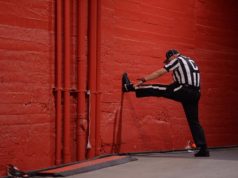By Landon Brandes
In the middle of a season, officials rarely think about injury prevention. But how often has this scenario happened to you? You are having one of the finest officiating seasons in your career and all of a sudden you strain a muscle in your leg or back, tweak your knee, or simply “hit the wall” and struggle finishing games with enough energy to call plays correctly. Many officials have, unfortunately, experienced that type of setback at one time or another during your career. It’s time to talk about active injury prevention.
When you look back and wonder what you could have done differently to prevent such a predicament the answer may be nothing, but in some cases these kinds of injuries can definitely be prevented.
Injury Prevention
From my experiences as a strength and conditioning professional, I have found that not all injuries and fatigue are avoidable; however, more times than not a simple total body strengthening routine followed regularly will have helped avoid those issues. A year-round physical training program has been proven time and time again, in countless medical journals, to help individuals avoid injuries during times of activity.
Sports officiating consists of explosive movements, acceleration, deceleration, agility and stamina. It is vital to begin the season at a training level that will allow you to stay healthy for the duration of the season. The sports you officiate are most likely fast-paced, explosive, multi-directional sports. That is why it is imperative to follow a program that will train the body to perform under these conditions. You would be amazed at how far just 15 to 30 minutes of strength training three to five days a week can go.
How to train
You don’t have to join your local gym and you don’t need any equipment for a number of exercises. They can be performed by virtually anyone, anywhere, at any time. Those exercises include squats, lunges, leg dead lifts, hip-flexions, push-ups, hip bridges, calf raises and more. For the moderate to highly trained individual, added resistance through weights could be beneficial. Perform each exercise slowly and be controlled.
Determine a plan and develop a routine that suits your officiating schedule. You should perform more exercises in the off-season months of your officiating schedule. Determine what will work best in-season so that you do not tire out your muscles in advance of a heavy week of officiating.
Work on areas of the body in-season that will actively produce better results and maximize injury prevention. For example, in baseball you’ll want to actively work on squats and lunges and minimize those exercises on days you’ll be behind the plate (you’ll get enough of them in at that time). Customize and cater a strengthening plan that suits your specific sport.
Most importantly, remember that something is better than nothing. Warm-up and stretch before exercising and always consult your physician before starting an exercise regimen.
Landon Brandes, Rockledge, Fla. Brandes is the Minor League Strength and Conditioning Coordinator for the Los Angeles Dodgers. He officiates men’s basketball at the Division II, NAIA, and JUCO levels. He is a certified strength and conditioning specialist who works with athletes on a daily basis.
What's Your Call? Leave a Comment:
Note: This article is archival in nature. Rules, interpretations, mechanics, philosophies and other information may or may not be correct for the current year.
This article is the copyright of ©Referee Enterprises, Inc., and may not be republished in whole or in part online, in print or in any capacity without expressed written permission from Referee. The article is made available for educational use by individuals.

















